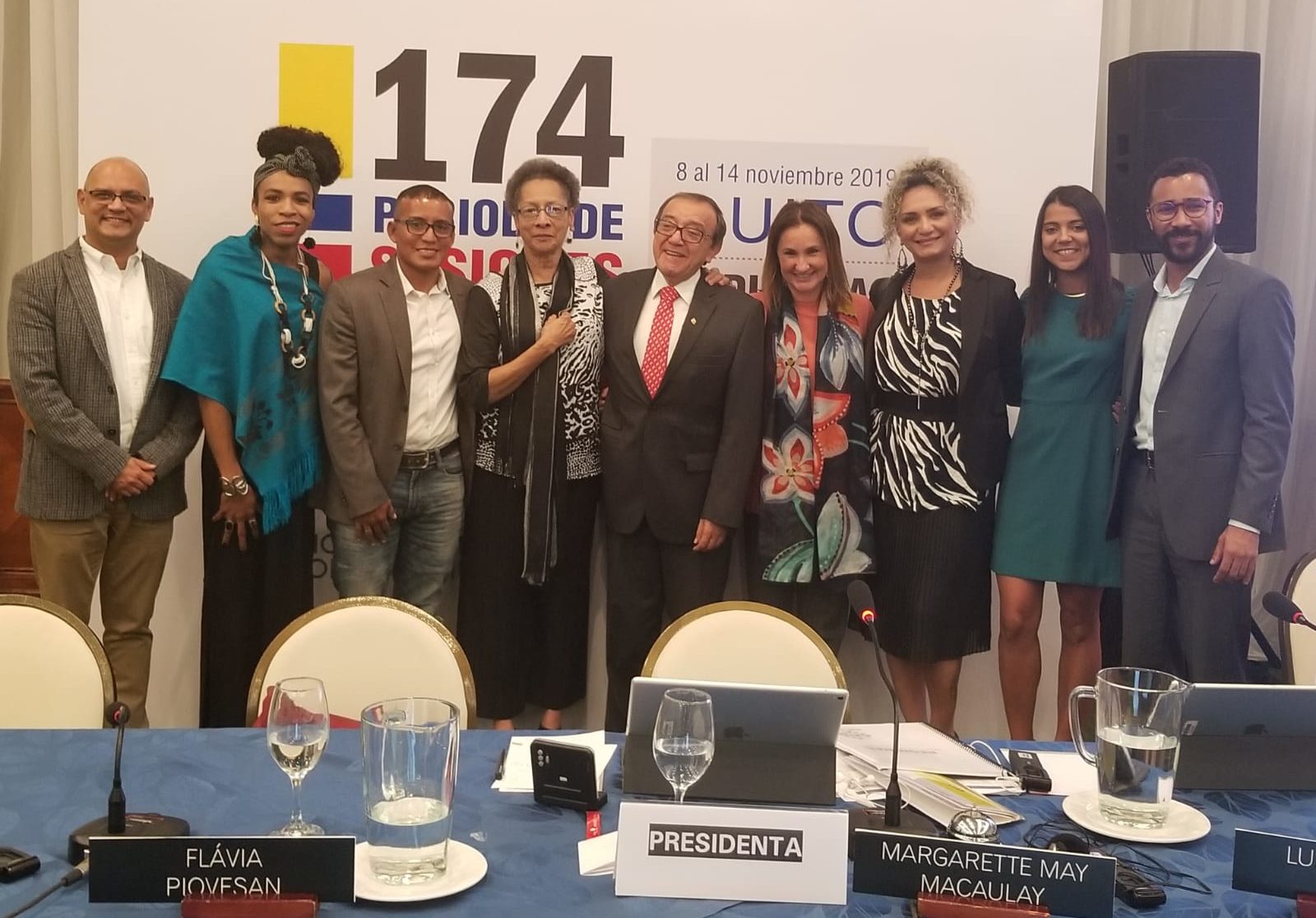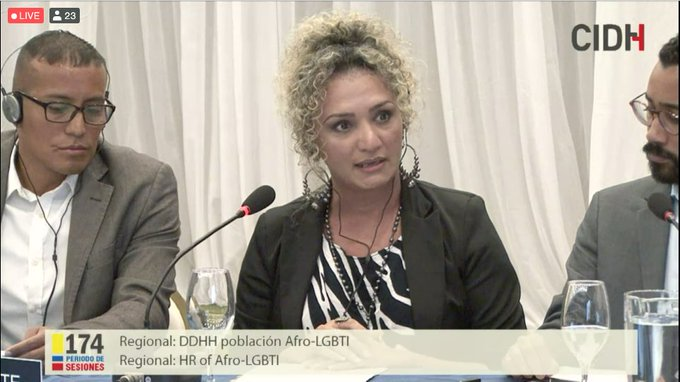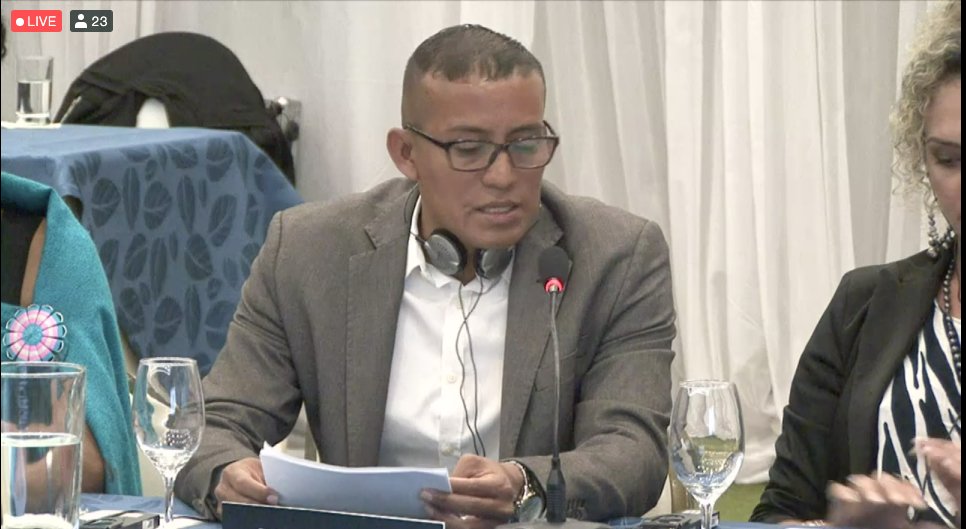“The situation of violence against Afro-LGBTI people is invisible and systematic in Latin America” Activists warn the IACHR
Quito, Ecuador. November 12, 2019. In the thematic hearing held during the 174 period of Hearings of the Inter-American Commission on Human Rights in Quito, Ecuador, LGBTI activists and Afro-descendants […]

Quito, Ecuador. November 12, 2019. In the thematic hearing held during the 174 period of Hearings of the Inter-American Commission on Human Rights in Quito, Ecuador, LGBTI activists and Afro-descendants from Brazil, Colombia, the Dominican Republic, and Peru presented on the situation of violence, lack of protection, and lack of knowledge of their prevailing rights in each of these States.
Throughout the space, the activists highlighted how Afro-descendants with sexual orientations and non-normative gender identities are at greater risk of suffering from violations of their rights, especially by the States’ general lack of knowledge on the differentiated effects suffered by people living this reality.
Likewise, the activists presented a summary of different cases of murder and violence against transgender people and Afro-descendants, especially those committed with a high degree of cruelty and hatred; in addition to remaining completely unpunished.

“In January of this year, in Brazil, a trans woman had her heart torn out and then replaced by the image of a saint. Her murderer was acquitted of the charge, even though he narrated in great detail how he had killed her and kept her heart at home with a smile on his face,” said Afro-Brazilian activist Bruna Benavides, a member of the National Association of Transvestites and Transsexuals, or ANTRA in Brazil.
According to information given by Benavides, this year alone, 110 trans people were killed in Brazil, 85% of them black. Likewise, the activist reported that 90% of the population of transvestites and trans women in this country are engaged in prostitution due to the lack of job opportunities.
Furthermore, she pointed out that this group of people are recurring victims of different State institutions due to the inaccessibility of appropriate healthcare services and of fair employment opportunities and recognition, as well as having a lack of respect for their identities. In this regard, Benavides added ,“… today we are afraid to walk the streets again, and as a defender of human rights, I do not feel safe despite the progress we have made because our leaders have common policies of racist hatred , male chauvinism…”
In this order, the leader Justo Arevalo representative of the Colombian organizations Arco Iris de Tumaco, the National Conference of Afro-Colombian Organizations (CNOA), and Somos Identidad, highlighted that contexts of rejection, violence, and discrimination within these communities towards people who assume a non-normative sexual orientation or gender identity create other types of cyclical and systemic violence that threaten the integrity of AfroLGBTI people. An example of this is in Colombia, where there is forced displacement towards cities that sharpen the circles of violence in which these people live.

“In March of 2019, a report on the realities experienced by Afro-LGBTI people was filed in Bogotá before the Jurisdiction for Peace, whose main findings show that documented violence and impact are blocked by very racial and class-particular relations, typical of the sociocultural, economic, and political environment in which they occur, prejudice as a factor of violence, and the responsibility of illegal armed actors in the face of serious violations of rights against Afro LGBT people, “Arevalo added in his speech.
Belén Zapata, an Afro-descendant trans activist from Peru, alerted the audience of the impact that police abuse has on the lives of Afro-descendant and transvestite people, highlighting that it sets a pattern of deep violence against their right to personal integrity in countries like Brazil, Colombia, Cuba, the Dominican Republic, and Peru.
Likewise, the activist referred to the access of healthcare services by trans-descendant Afro-descendant women in the region, which is characterized in its generality for not being efficient or worthy of use by this population.
In this regard, the activist added: “There are still cases in which medical personnel offer inadequate and/or improper care to Afro-descendant transgender women. This pattern is particularly serious in cases of care for Afro-descendant transgender women who perform sex work and are taken in for injuries as a result of physical aggressions. But also, in cases where the request for other services is related to reproductive health or HIV / AIDS. “
Violation of the rights of Afro-LGBTI people is systematic
“As long as we avoid highlighting the intersection between race and sexual diversity, we will continue to perpetuate a system that makes the Afro-descendant LGBTI community invisible; we will continue to have legal structures, public policies, and government institutions that do not protect or guarantee the human rights of the Afro LGBTI population,” added Katherine Ventura, representative of the American University Legal Clinic. She also pointed out that there are patterns of violence that are particular to the Afro-LGBTI population, naming three: 1) Absence of rights’ guarantees focused on the Afro-LGBTI community; 2) Lack of implementation of existing laws and 3) Inadequate data collection, particularly in criminal investigation processes against Afro-LGBTI people.
On this matter, the Commissioners of the IACHR indicated the responsibility of the States to collect data, generate policies, and promote processes that guarantee the reparation, respect, and recognition of the rights of Afro-LGBTI people. In this regard, Commissioner Margarette May Macaulay urged States to ratify the Convention on the Elimination of All Forms of Discrimination as an alternative that seeks to address the issues of Afro-descendants with sexual orientations and non-normative gender identities.
To finalize the hearing, the organizations requested that the IACHR to urge the States of Brazil, Colombia, the Dominican Republic, and Peru to:
1. Urgently investigate cases of homicide and police abuse that involve Afro-LGBTI persons and, consequently, register and characterize them properly.
2. Implement the recommendations of the Afro-LGBTI population that this Commission has made since 2015, particularly those focused on the development of public policies that explicitly include the Afro-LGBTI population.
3. As part of the fulfillment of the objectives proposed in the Decade of Afro-descendants 2015-2024, the Afro-LGBTI population should be included as a beneficiary of justice and development-oriented measures in the region, and it should be requested that all states comply with the recommendations of the Inter-American Commission regarding the importance of providing differentiated data on sexual orientation and gender identity.
4. Suggest the ratification of the Inter-American Convention against Racism, Racial Discrimination and Related Intolerances and the Inter-American Convention against All Forms of Discrimination and Intolerance to all States.
5. That the Inter-American Commission publish the report of the on-site visit to Brazil in 2018 and the rapporteur on the rights of Afro-descendants and racial discrimination visit Brazil to better know the situation of the Afro-LGBTI population, with effective participation of civil society organizations.

